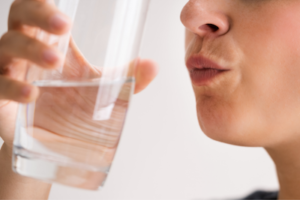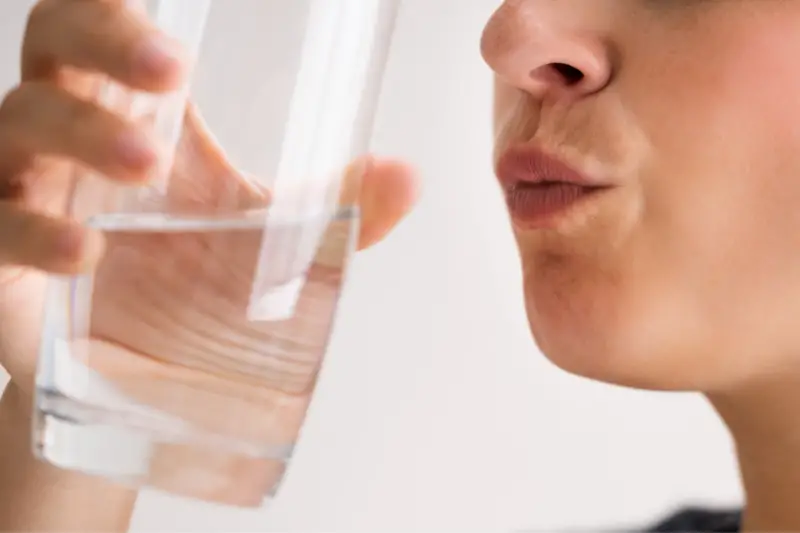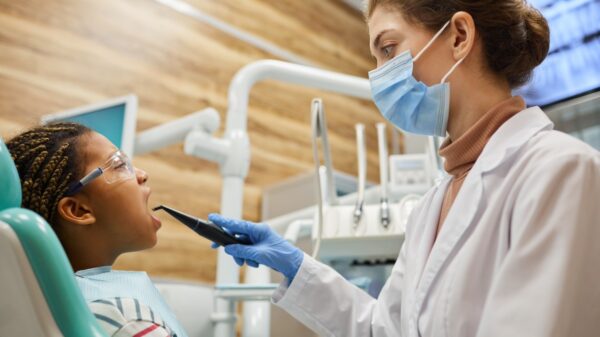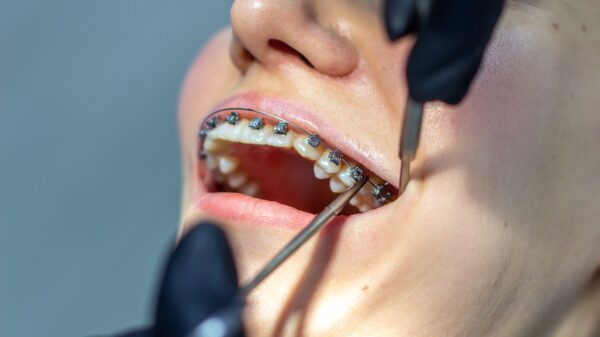Why You Should Use Salt Water Mouth Rinse
Salt water mouth rinse is the superior option to alcohol-based mouthwash. Salt water mouth rinse has many health benefits. It can tackle problems like removing bacteria in the mouth that many other mouth rinse options can’t provide. I have been using salt water for years, and have seen an improvement in my mouth.
What are the benefits of using a salt water mouth rinse? There are many benefits to using a salt water rinse instead of the traditional mouthwash, some of which include:
- Helps whiten teeth
- Get rid of bad breath
- Kills bacteria that causes cavities
- Eliminate plaque
- Cleans the entire mouth
Keep reading to learn more about why you should incorporate a salt water mouth rinse into your oral hygiene routine.
Advantages of Using Salt Water Mouth Rinse
Have you ever felt that horrible feeling of having a terrible taste in your mouth and no amount of brushing or rinsing will get rid of it? A common misconception is that the best way to clean out bacteria and eliminate bad tastes from one’s mouth is with over-the-counter, antibacterial mouthwashes. These products do not kill all the bacteria in the mouth, and can often cause more harm than good.
The best way to combat these issues is by using a salt water rinse – it is 100% safe and effective. Salt water rinse leaves you with a fresh and clean feeling and it can also help to eliminate bad smells in the mouth. In addition, it can prevent further issues such as cavities and other dental problems. It is one of the safest ways to clean the mouth and get rid of bacteria.
For hundreds of years, people have been using saltwater to rinse their mouths instead of regular water. Although little research has gone into the practice, many studies show that this is a healthy alternative. It can even help prevent tooth decay! In fact, a study done in 1989 showed that salt water had more antiseptic effects than lavender oil and saline when used in an experiment.
Many holistic health care practitioners believe that infections in the mouth can lead to disease states throughout the body. This idea has increased interest in alternative therapies such as the use of salt water for its antibacterial effects.
Using a saltwater rinse may also help reduce bacteria in the mouth, which is why the dental professionals at Tulsa Sculpted Smiles recommend rinsing with plain warm salt water when experiencing oral irritations. For example, a person who has an ulcerated area can rinse their mouth with salt water to promote healing and reduce inflammation. Salt-water mouth rinses are very useful if you are experiencing gum inflammation.
Why is it Important to Use a Mouth Rinse in the First Place?
Many people forget about the power of mouth rinse because they only think about it when something needs to be fixed. Using a mouth rinse can prevent oral hygiene problems from happening in the first place. If you are drinking coffee, tea, or soda every day, you know how normal it is for your teeth to feel slightly sensitive afterward.
This happens because those types of beverages contain high amounts of acid, and as we all know, acids can cause erosion on the teeth. The great thing about mouth rinses is that they help protect your teeth against such erosive contact.
It’s also important to remember that you don’t only use your mouth when drinking or eating; it’s also important to clean your mouth during the day when it feels necessary. This is because your mouth produces bacteria all day long, including while you are asleep.
It may seem unnecessary to use a rinse, but trust me, not doing so will cause visible results over time. Using a mouth rinse is extremely convenient as well! You can carry it with you on the go.
How to Use Salt Water Rinse
Using a salt water rinse is similar to most mouthwash products. However, there are slight differences. Here is a step-by-step process and tips for using salt water rinse.
Salt water rinse can be used before or after brushing your teeth, this can be a personal preference. However, many health professionals suggest using it after you have brushed your teeth and flossed.
Put your rinse in a cup and rinse your mouth with the mixture thoroughly. Once you have covered your mouth with the solution, be sure to spit it out. If you swallow some of the salt water mixture accidentally, don’t worry; it won’t harm you. Just make sure this isn’t a consistent happening. Swallowing a lot of salt water could be potentially harmful.
This method is effective because when salt water dries in your mouth, it pulls moisture from bacteria cells, leaving them shriveled up and unable to cause cavities or gum disease.
Finally, if you have any concerns about your salt water mouth rinse, you should speak with a doctor or dentist to have them addressed.
How to Make Your Own Salt Water Rinse Solution
 There are many ways to use a salt water mouth rinse. One way that has been proven to be effective is to mix one teaspoon of salt into 1/2 cup (120 mL) of warm water.
There are many ways to use a salt water mouth rinse. One way that has been proven to be effective is to mix one teaspoon of salt into 1/2 cup (120 mL) of warm water.
You can also use 1 tablespoon (15 mL) of table salt instead of the teaspoons, but make sure you measure it accurately with a measuring spoon.
If you are using salt tablets, use only one tablet in 1/2 cup (120 mL) of water. You can also add a pinch of baking soda per 1/2 cup (120 mL) of water to improve the taste or make it less salty.
You can also add a teaspoon of natural antiseptic herbs such as Sage, Goldenseal, Echinacea, or Essential Oil of Cloves to enhance the effects.
If you don’t like the taste of salt water, try some other natural rinses in your mouth. For example, you can mix one tablespoon (15 mL) of apple cider vinegar in 1/2 cup (120 mL) of warm water or rinse with herbal tea like Sage or Goldenseal. This is made by boiling about three teaspoons (15 g) of the tea leaves in 1/2 cup (120 mL) of water.
A simple guideline to follow for a salt water rinse is one part salt, two parts warm water. Mix until all of the salt has been dissolved, then rinse your mouth out thoroughly for about 60 seconds. Spit out the liquid, don’t swallow it!
Why Salt Water Rinse is Superior to Alcohol-Based Mouth Wash
Mouthwash can be bad for your teeth if it has alcohol content, which dries out your mouth. This makes your mouth more susceptible to cavities. Mouthwash is often overused, which causes the harmful effects of mouthwash to outweigh its benefits. Regular use can worsen bad breath and cavities.
Salt water rinsing has many benefits over mouthwash including being 100% safe, effective, non-abrasive, low cost, and easy to do. It can be done anywhere. The benefits of regular use include killing bad breath causing bacteria, whitening teeth, getting rid of plaque, and building up oral tolerance to reduce sensitivity.
Salt water rinsing is a safe substitute for using mouthwash which has been found to have harmful effects on teeth such as gum tissue or cavities. It is also a good substitute for those who cannot afford expensive mouthwash or dental problems such as sensitivity and bad breath.
The best part is, a salt water rinse can be done without special equipment at any time of day! Simply keep a small bottle of the mixture in your purse, locker, or bathroom so you will always have access to it. And don’t worry about safety – salt water used for rinsing won’t make you more thirsty or dehydrated.
A salt water rinse can be used as a substitute to mouthwash without harmful effects. The popular belief that it is essential and necessary might not hold true, but this doesn’t mean you shouldn’t take care of your teeth!
A saline solution kills bad-breath causing bacteria and whitens teeth without damaging tooth enamel like some commercial brands do when they contain alcohol or other chemical agents such as hydrogen peroxide. It also makes your entire mouth feel fresh and clean.
Does Salt Water Rinse Save You Money?
Salt water rinsing is a simple, cost-effective, and safe way of cleaning out bacteria from one’s mouth. It can be done at any time of day without expensive equipment or tools. There are many different benefits to using a salt water rinse and it is a good habit to get into. No need to buy expensive equipment or tools because salt water used for rinsing can be done anywhere with a premixed bottle, if available. If not, mix salt and warm water until it goes back to the correct mixture.
Eliminating dental plaque with salt water is a simple and effective way to reduce the harm of having it, especially when premixed bottles can be found in pharmacies or convenience stores. It is also one of the cheapest and safest ways to clean out bacteria that cause bad breath, plaque, cavities, and other dental problems.
Dental hygiene is all based on personal health and preferences. Be sure to talk to your dentist about the pros of using a salt water rinse. You will be glad you did!












